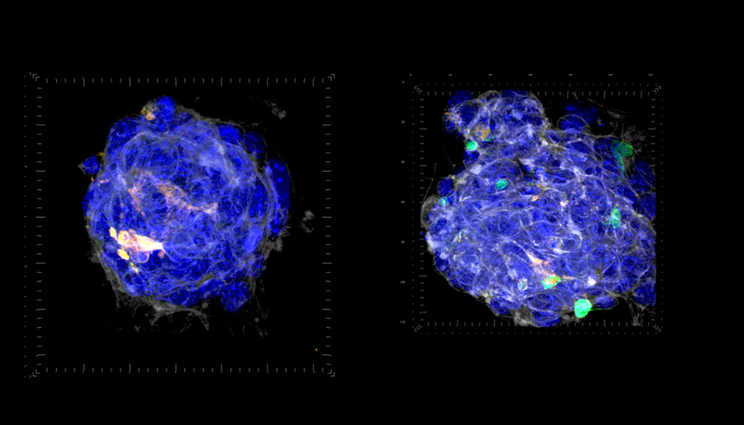2022-03-16 ローレンスリバモア国立研究所(LLNL)
Lawrence Livermore National Laboratory (LLNL) scientists exploring the interaction between cancer cells and the extracellular matrix (ECM) — the “scaffolding” of organs — found that proteins in the ECM can dramatically impact the immune system’s ability to kill tumors. Researchers said the findings, published online in the journal Biomaterials, could represent a novel approach to studying immunosuppression found in many breast cancers and open new pathways of activating the immune system to target cancer.
<関連情報>

細胞外マトリックスはin vitroにおけるT細胞による悪性腫瘍のクリアランスを調節する Extracellular matrix modulates T cell clearance of malignant cells in vitro
ClaireRobertsonaAimySebastianbAubreeHinckleybNaiomy D.Rios-ArcebWilliam F.HynesaSkye A.EdwardsaeWeiHebNicholas R.HumbElizabeth K.WheeleraGabriela G.LootsbcMatthew A.ColemanbdMonica L.Moyaa
Abstract
Despite the success of T cell checkpoint therapies, breast cancers rarely express these immunotherapy markers and are believed to be largely “immune cold” with limited inflammation and immune activation. The reason for this limited immune activation remains poorly understood. We sought to determine whether extracellular matrix substrate could contribute to this limited immune activation. Specifically, we asked whether extracellular matrix could alter T cell cytotoxicity against malignant mammary gland carcinoma cells (MCC) in a setup designed to promote maximal T cell efficacy (i.e., rich media with abundant IL2, high ratio of T cells to MCC). We observed that T cell clearance of MCC varied from 0% in collagen 4 or 6 conditions to almost 100% in fibronectin or vitronectin. Transcriptomics revealed that T cell function was defective in MCC/T cell cocultures on collagen 4 (Col4), potentially corresponding to greater expression of cytokines MCC cultured in this environment. In contrast, transcriptomics revealed an effective, exhausted phenotype on vitronectin. The observation that Col4 induces T cell suppression suggests that targeting tumor-ECM interactions may permit new approaches for utilizing immunotherapy in tumors which do not provoke a strong immune response.
Graphical abstract
We studied clearance of malignant cells by strain mismatched T cells in a microenvironmental microarray. We observed a stark difference in clearance of malignant cells cultured in different environments, which we correlated to altered expression of T cell differentiation markers, chemokines and other immunosuppressive factors in different ECM conditions.



